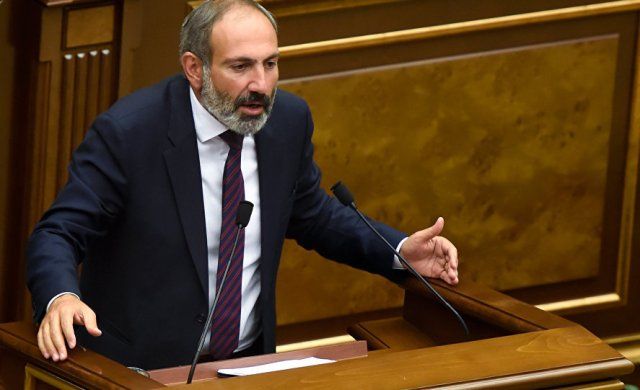Humbled in Brussels, Pashinyan retaliates in his own backyard

By Orkhan Amashov
Armenian Prime Minister Nikol Pashinyan epitomises the excruciating sufferings and morbidity of a multitude driven by tempestuous urges. He is cracking under the strain of the ungrateful task incumbent upon him. On 25 May, whilst addressing the Armenian National Assembly upon his return from the third EU-mediated trilateral convocation, the Armenian leader was again compelled to engage in prevarication, bordering on what Winston Churchill would have called “terminological inexactitude”.
"The ethnic Armenian population of Karabakh" - the expression used by Charles Michel, European Council President, in his post-meeting press statement – has not gone unnoticed in Yerevan. In fact, it has caused significant perturbation, compelling the prime minister, if not to denounce the phrase, but distance himself from it, in his "parliamentary hour" speech on 25 May.
To be blunt, the third Brussels-mediated trilateral meeting was a reasonably satisfactory success for Baku and a perfectly digestible defeat for Yerevan. It has reinvigorated the slackened negotiations and re-emphasised the warp and weft of the peace agenda.
The general practice suggests that a post-meeting statement made by a mediator is not a mere observation by its announcer, but a document to which parties sign as indicative of their acquiescence. Therefore, the language of such a communication is usually declarative and measured, yet sufficiently clear upon what has been agreed.
The same applies to Charles Michel's post-meeting statement. The phrase “the ethnic Armenian population of Karabakh” is indicative of how the matter is viewed through the prism of Brussels. Pashinyan claims that he and President Aliyev did not concur on any formula and the EU chief simply developed a compromise construct.
It is perfectly true that it was incumbent upon Charles Michel to phrase his conclusive statement in such a way as to render it inclusive, to a reasonable extent, of both sides’ concerns. The truth of the matter is that, by mentioning the importance of “addressing the rights and security of the ethnic Armenian population of Karabakh”, he has incorporated the point, which constitutes the dominant Armenian concern, into the statement; but he did so in such a manner that neither cast an aspersion on the territorial integrity of Azerbaijan, nor deviated from the logic of post-conflict normalisation.
The revenge-driven Armenian opposition claims that this formulation is a blow to Yerevan, as it downgrades what they still view as “a territorial entity” to “a certain ethnic population residing in a particular geography”. In principle, they are right. This is exactly what the construct denotes. The problem is that the revanchist forces find it abhorrent, whereas Pashinyan has not yet grown the backbone to call a spade a spade.
In his address, Pashinyan referred to the “six-point package” of his government, submitted in response to Baku’s five points, as Yerevan’s “observation and agenda”. This was, one can tentatively assume, an indirect reply to just criticisms levelled against Armenia’s so-called peace offer, which was neither “principle-based”, nor constructive.
It behoves one to recall that none of the points of the belatedly resurfaced document that were inadmissible to Baku made it to Michel’s post-meeting statement. That is what matters at present, not Pashinyan’s contrived insinuations aimed at expostulating the brunt of his displeasure.
In an attempt to repost some of the attacks engineered by the opposition, he took recourse to a technique over which he gained mastery during his years in power - he blamed the previous administrations for the hopelessness of the present state of affairs.
Pashinyan claimed that, by agreeing to the now-archaic Madrid Principles, Robert Kocharyan, the former President, effectively de-legitimised the 1991 so-called “referendum”, and by agreeing to work with Baku on the principles of a future referendum, discredited his own claim that “Nagorno-Karabakh” had never been part of independent Azerbaijan.
Pashinyan also maintained a hard-line on the subject of enclaves, stating the matter was not discussed in Brussels. Here, there is a room for toughness, as enclaves do not constitute an immediate agenda and one can do a bit of shilly-shallying. Such a contrived form of uncompromising tone would not go amiss when one thinks of the pressure being exerted upon the incumbent government in the light of the ongoing protests.
Pashinyan went on reasserting that Bashkend (Artsvashen) is a de jure Armenian exclave inside Azerbaijan, whereas there is no legal ground to assume Azerbaijani exclaves exist inside Armenia. Here, Pashinyan imitates the negotiating technique of saying that "what is mine is mine, what is yours is a subject for discussion". The snag here is that he can only imitate this in his backyard, and not truly practice it.
After the second Brussels-mediated trilateral meeting that took place on 6 April, Pashinyan stunned the National Assembly, stating that not recognising the territorial integrity of Azerbaijan, a first-rate ally of Turkey, is dangerous and that the international community expects Yerevan to act accordingly.
On this occasion, his post-Brussels "parliamentary hour" did not entail anything akin to crossing the liminal line. Evidently, he felt this juncture was unsuitable for a "shocking admission". Yet, time moves on and his task has not changed - he has to say to his people, in a language that the audience will understand and accept, that Karabakh is Azerbaijan and it cannot be helped.
---
Follow us on Twitter @AzerNewsAz
Here we are to serve you with news right now. It does not cost much, but worth your attention.
Choose to support open, independent, quality journalism and subscribe on a monthly basis.
By subscribing to our online newspaper, you can have full digital access to all news, analysis, and much more.
You can also follow AzerNEWS on Twitter @AzerNewsAz or Facebook @AzerNewsNewspaper
Thank you!
